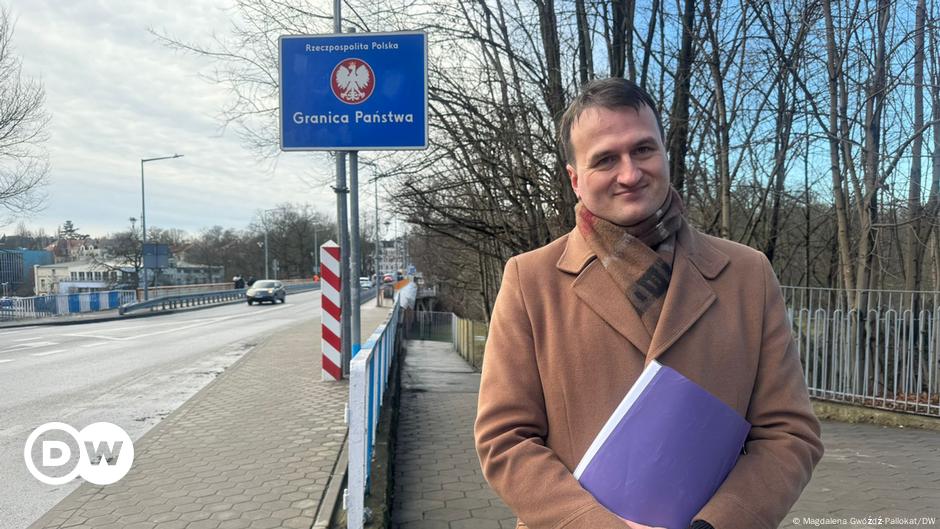Jacob Wolinsky seems like a quiet guy, not the kind who’s looking for a fight. And yet they have decided to take Germany to court over checks at the German-Polish border.
Wolinsky is positively surprised by the response to his case, but also a little stressed. “Thankfully I have my family at home,” the 37-year-old says with a smile. He says his family helps him relax.
Born in the Polish border town of Zgorzelec, Wolinski has been living in the German city of Görlitz for some time. Zgorzelec and Görlitz are on opposite banks of the Lusatian Neisse and are like two parts of one city separated by the river.
He works for a large German company and commutes regularly between the two neighboring countries. Wolinsky is often stopped at the border, perhaps because he drives a minivan with blacked-out windows.
Are vans given special attention at the border?
When searching for migrants entering the country illegally, German police officers often focus on such vehicles.
“I use this vehicle for private purposes, there are children’s car seats in the back, and my papers show where I am registered. I do not know on what basis the police can assume that I am involved in people smuggling across the border. I can.” he told DW.
Both Germany and Poland are part of the Schengen area, which includes 29 European countries that have abolished checks at their shared borders. The rules governing travel within the area are contained in the Schengen Borders Code.
Wolinsky says he is not aware that the rules of the Schengen Borders Code do not apply to minivans and that these vehicles may be checked more frequently than others.
The case focuses on the legality of border checks
Although he has been stopped and checked multiple times at the border, Wolinsky is taking Germany to court over a specific border check he experienced.
“Initially the police officers could not tell me on what legal basis they wanted to check my car,” he says. “Then they contacted other officers. After that, they referred to two paragraphs. “
But he was not convinced by the officers’ arguments, so he decided to take action against Germany.
‘Germany is systematically violating European law’
“The German government must immediately stop the investigation at the Polish border,” explains their lawyer Christoph Tomaten. “It is not acceptable that Germany is systematically violating European law with these investigations. Freedom of movement of EU citizens is an outstanding good that should no longer be questioned. The European Court of Justice has repeatedly is insisted upon, and that is binding on the German authorities and courts.”
This is not the first time the Berlin-based lawyer has been sought for support in a matter related to border controls within the EU. The website Legal Tribune Online (LTO) describes the case of an Austrian citizen who took action against Austria after being checked on a train traveling from Austria to Germany.
Tomaton was the lawyer in that case also. The case went all the way to the European Court of Justice in Luxembourg. According to the LTO, the court ruled that border checks cannot be initiated or extended without reason.
change in schengen border code
In short, Wolinsky is not the first person to take an EU member state to court over this matter.
“Last year, the Schengen Borders Code was changed,” explains Johanna Haase of the Institute for European Politics in Berlin. “Now, countries can introduce border checks for a longer period of time – for two years – and then close it under certain conditions. Can be increased twice.”
“They can use the same reason to extend the checks to three years,” he told DW, “but they can certainly change that reason.”
a return to the past
But back to Görlitz. Wolinsky says life in the East German border town has actually worsened since border controls resumed in October 2023.
Long-forgotten problems have returned, he says: “There is congestion on the motorway, in the towns and at the border crossings.”
Another thing locals had forgotten was the close scrutiny by police officers, he told DW, adding that he felt like a suspected human trafficker whenever he crossed the border.
Wolinski is suing the Federal Republic of Germany, which is “represented by the Federal Police Directorate in Pirna.”
Because the case is ongoing, the German Federal Police declined to comment.
Temporary border checks are allowed
The Schengen rules, which are the legal basis for Europe’s open border system, actually allow temporary border checks in emergency situations. For example, such investigations are permitted in the event of a “serious threat” to domestic security.
However, there must be good reasons for the introduction of checks, and they cannot simply be extended at will, as the judgment against Austria in the ECJ has shown.
Uncontrolled migration and terrorist attacks are reasons being used by Germany to justify emergency border checks, which have been extended several times. “I would really question whether the threat is so great that Germany is forced – as the rules allow – to introduce border checks as a last resort,” says Haase. “This is another reason why I am so curious to know how the case will proceed.”
schengen and dublin
The reason why Germany and other countries are pushing the limits of the Schengen Borders Code with their border checks is linked to the Dublin Regulation. Named after the Irish capital, this EU regulation stipulates that individuals seeking protection must first register in an EU country – which, as a rule, is not Germany or Austria.
However, the fact is that this regulation is being massively weakened, whether by the activities of human smugglers or the fact that migrants are being turned over at the border by some authorities.
Wolinsky is very aware of this. “I would suggest considering investing elsewhere in our security,” he told DW. “I am confident that our Polish border guards, who are guarding our eastern border and, therefore, the EU’s external border, would be happy if the people guarding the border here would support them there.”
defending fundamental european freedoms
Wolinsky says that what matters to him is the protection of fundamental European freedoms, namely the freedom of movement guaranteed by the Schengen Agreement.
“I want to defend Schengen. I’m taking Germany to court because I live on the German-Polish border, but my case is not the only one.” The Danes control their borders, he says, as do the Austrians, French and others.
“We are seeing a slow disintegration of the Schengen area and my opinion is that we must act now to stop it,” he told DW. Otherwise, Wolinsky says, Europe risks losing one of its great achievements.
Pole wishes to point out that he is in no way trying to incite anti-German sentiment with his case, which is certainly not without occasion. “That’s what happens with good friends: sometimes one does something stupid and gets carried away,” he says. In such cases, he adds, one “friend” has to push the other and say: “Not this far and no further.”
This article was originally published in German and adapted by Angiel Flanagan.


